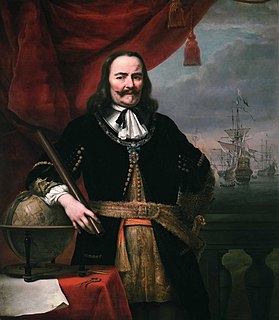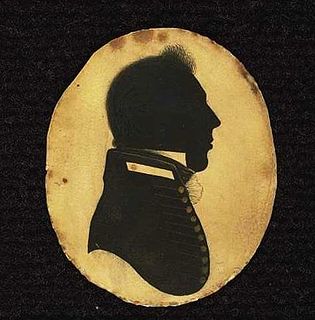Related Research Articles

The First Anglo-Dutch War, or simply the First Dutch War, was a conflict fought entirely at sea between the navies of the Commonwealth of England and the United Provinces of the Netherlands. It was largely caused by disputes over trade, and English historians also emphasise political issues. The war began with English attacks on Dutch merchant shipping, but expanded to vast fleet actions. Although the English Navy won most of these battles, they only controlled the seas around England, and after the tactical English victory at Scheveningen, the Dutch used smaller warships and privateers to capture numerous English merchant ships. Therefore, by November 1653 Cromwell was willing to make peace, provided the House of Orange was excluded from the office of Stadtholder. Cromwell also attempted to protect English trade against Dutch competition by creating a monopoly on trade between England and her colonies. It was the first of the four Anglo-Dutch Wars.

Michiel Adriaenszoon de Ruyter was a Dutch admiral. Widely celebrated and regarded as one of the most skilled admirals in history, De Ruyter is arguably most famous for his achievements with the Dutch Navy during the Anglo-Dutch Wars. He fought the English and French forces and scored several critical victories, with the Raid on the Medway being the most famous among them.

The naval Battle of Portland, or Three Days' Battle took place during 18–20 February 1653, during the First Anglo-Dutch War, when the fleet of the Commonwealth of England under General at Sea Robert Blake was attacked by a fleet of the Dutch Republic under Lieutenant-Admiral Maarten Tromp escorting merchant shipping through the English Channel.

General at Sea Robert Blake was an important naval commander of the Commonwealth of England and one of the most famous English admirals of the 17th century. His successes have been considered to have "never been excelled, not even by Nelson" according to one biographer. Blake is recognised as the chief founder of England's naval supremacy, a dominance subsequently inherited by the British Royal Navy into the early 20th century. Despite this, due to deliberate attempts to expunge the Parliamentarians from history following the Restoration, Blake's achievements tend to remain unrecognized.

The Battle of the Kentish Knock was a naval battle between the fleets of the Dutch Republic and England, fought on 28 September 1652, during the First Anglo-Dutch War near the shoal called the Kentish Knock in the North Sea about thirty kilometres east of the mouth of the river Thames. The Dutch fleet, internally divided on political, regional and personal grounds, proved incapable of making a determined effort and was soon forced to withdraw, losing two ships and many casualties. In Dutch the action is called the Slag bij de Hoofden.

The naval Battle of Dungeness took place on 30 November 1652 during the First Anglo-Dutch War near the cape of Dungeness in Kent.

The naval Battle of Solebay took place on 28 May Old Style, 7 June New Style 1672 and was the first naval battle of the Third Anglo-Dutch War. The battle ended inconclusively, with both sides claiming victory.
The Battle of Plymouth was a naval battle in the First Anglo-Dutch War. It took place on 16 August 1652 and was a short battle, but had the unexpected outcome of a Dutch victory over England. General-at-Sea George Ayscue of the Commonwealth of England attacked an outward bound convoy of the Dutch Republic commanded by Vice-Commodore Michiel de Ruyter. The two commanders had been personal friends before the war. The Dutch were able to force Ayscue to break off the engagement, and the Dutch convoy sailed safely to the Atlantic while Ayscue sailed to Plymouth for repairs.

Rear-Admiral Henry Lidgbird Ball (1756–1818) was a Royal Navy officer, best known as the commander of the First Fleet’s HMS Supply, exploration of environs around Port Jackson and Broken Bay, helping establish the Norfolk Island penal settlement, and for discovering and naming Lord Howe Island.

Abraham van der Hulst was a Dutch admiral in the 17th century.

Victory was a great ship of the English Navy, launched in 1620 and in active service during the seventeenth century's Anglo-Dutch Wars. After an seventy-year naval career, she was broken up at Woolwich Dockyard in 1691 and her timbers reused in other vessels.

HMS Gloucester was a 50-gun, third rate, Speaker-class frigate, originally built for the navy of the Commonwealth of England during the 1650s and taken over by the Royal Navy after the restoration of the monarchy in 1660. The ship participated in multiple battles during the Anglo-Spanish War of 1654–60, and the Second and Third Anglo-Dutch Wars. Gloucester was wrecked in 1682 on a sandbar while carrying the Duke of York.
HMS Advice was a 40-gun fourth-rate frigate, built for the Commonwealth of England and transferring to the Royal Navy upon Britain's restoration of the monarchy in 1660.

John Fowke was an English merchant and politician. He served as a Sheriff of London for 1644 and Lord Mayor of London for 1652.
Richard Badiley was an English naval officer. He saw service during the First Anglo-Dutch War.
Andrew Ball, was an English officer of the Royal and Commonwealth Navy.
Roger North was an English colonial projector.
Vice-admiral Sir Richard Stayner (1625–1662) was an English naval officer who supported the Parliamentary cause during the English Civil War and the Interregnum. During the First Anglo-Dutch War he commanded the Foresight in actions at Portland (February), and the Gabbard (June), and in the Battle of Scheveningen, 1653. During the Anglo-Spanish War (1654–60), he won renown and a fortune in prize money when he captured a great part of the Spanish West Indian treasure fleet off Cadiz in 1656. He was knighted by the Lord Protector Oliver Cromwell for services in Admiral Robert Blake's destruction of Spanish ships at Santa Cruz, 1657. He was a rear-admiral of the fleet which brought Charles II to England in 1660. He was again knighted at the Restoration. He died at Lisbon, while serving as vice-admiral of the Mediterranean fleet.

Brederode was a ship of the line of the Maas Admiralty, part of the navy of the United Provinces of the Netherlands, and the flagship of the Dutch fleet in the First Anglo-Dutch War. Throughout her career, she carried from 49 to 59 guns. She was named after Johan Wolfert van Brederode, the brother-in-law of stadtholder Frederick Henry, Prince of Orange.

Sir John Harman was an English naval officer who was captain and then admiral during the three Anglo-Dutch wars between 1652 and 1673. He fought in several major battles. He was captain of the flagship of the Duke of York, the future King James II of England, in the Battle of Lowestoft in 1665. The Dutch were defeated but escaped when Harman reduced sail due to a mistaken order. There was a great scandal over this incident, but Harman was completely absolved and was promoted to rear admiral. He played an epic role in the St. James's Day Battle in 1666. In 1667 he destroyed a French fleet off Martinique, then captured the French and Dutch colonies in South America. He died while still active as an admiral during the Third Anglo-Dutch War.
References
![]() This article incorporates text from a publication now in the public domain : Laughton, John Knox (1885). "Barker, John (d.1653)". In Stephen, Leslie (ed.). Dictionary of National Biography . 3. London: Smith, Elder & Co.
This article incorporates text from a publication now in the public domain : Laughton, John Knox (1885). "Barker, John (d.1653)". In Stephen, Leslie (ed.). Dictionary of National Biography . 3. London: Smith, Elder & Co.